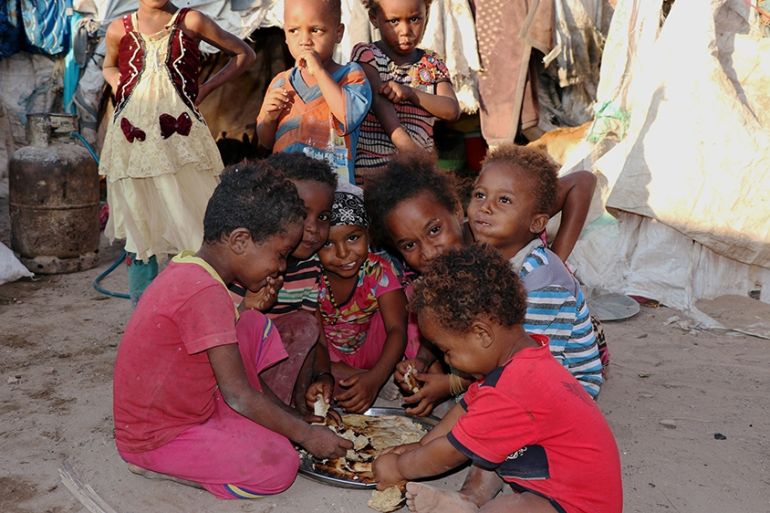G20’s Saudi arms sales three times as much as aid to Yemen: Oxfam
Charity says G20 states sold weapons worth $17bn to Saudi Arabia since it joined Yemen war in 2015, but gave a third of that amount as aid.

The member states of the Group of 20 (G20) have sold more than $17bn worth of weapons to Saudi Arabia since it intervened in neighbouring Yemen’s conflict in 2015, Oxfam said.
In a report released on Tuesday, the charity organisation said the figure was three times more than what the G20 members have given to Yemen as humanitarian aid.
Keep reading
list of 3 itemsChild malnutrition reaches new highs in parts of Yemen: UN
Yemen: UN calls for ceasefire as clashes resume in Hodeidah port
The report was released as G20 leaders prepare to meet virtually this week for a summit hosted by Saudi Arabia.
While some European nations have halted arms sales to Riyadh after it launched a military campaign in Yemen – which the United Nations calls the world’s worst humanitarian crisis – many G20 members have continued to supply it with arms.
In March 2015, a coalition led by the oil-rich kingdom launched a campaign of aerial bombardment aimed at countering the Iran-aligned Houthi rebels and reinstating the internationally recognised government of President Abd-Rabbu Mansour Hadi.
According to the Stockholm International Peace Research Institute (SIPRI), a defence think-tank, Saudi Arabia was the world’s top arms importer between 2014 and 2018, spending $16.9bn on weapons, with at least $4.9bn of that amount spent on European arms.
Oxfam’s Awssan Kamal said it is “shocking to see that level of business happening” as Yemen enters its sixth year of conflict, with 80 percent of the impoverished country’s 30 million people in need of help.
“As we work … to respond to the coronavirus, we’re seeing a dramatic drop in the humanitarian funding levels,” Kamal told Al Jazeera.
“We need to call on world leaders today to take responsibility, use the momentum of the G20 this week to ensure that there are sufficient talks around the humanitarian funding.”
‘Immediate ceasefire’
Rights groups have criticised the Saudi-led coalition for air raids that have killed civilians at hospitals, schools and markets, and urged the Western governments to halt arms exports to Saudi Arabia and its allies in the stalemated conflict.
According to Oxfam, there has been “one air raid every ten days” on hospitals, clinics, wells and water tanks during the war.
“The arrival of coronavirus has only worsened these dire circumstances. And yet the United Nations’ response plan to get clean water, food and medical care to the most vulnerable is only 44 percent funded this year,” the charity group said.
More than 100,000 people have been killed in the war, according to the Armed Conflict Location and Event Data, including 12,000 civilians.
The conflict in Yemen is widely seen in the region as a proxy war between rivals Saudi Arabia and Iran. Riyadh launched informal talks for a ceasefire with the Houthis late last year as it seeks to exit a costly war.
However, a surge in fighting in recent weeks has killed dozens of people in the key port city of Hodeidah, despite a UN-sponsored ceasefire in place in the area. The port serves as the war-torn country’s main entry point for commercial imports and much-needed aid.
According to Kamal, what Yemenis urgently need is an “inclusive peace process and an immediate ceasefire”.
According to the UN’s World Food Programme, 24 million Yemenis are in need of humanitarian assistance, while 20 million are food-insecure and face another famine.
“Having suffered years of death, displacement and disease, the people of Yemen need these powerful members of the international community to bring all parties to the conflict together to agree to an immediate countrywide ceasefire and return to negotiations committed to achieving a lasting peace,” Oxfam’s Yemen director Muhsin Siddiquey said.
“Making billions from arms exports which fuel the conflict while providing a small fraction of that in aid to Yemen is both immoral and incoherent. The world’s wealthiest nations cannot continue to put profits above the Yemeni people.”